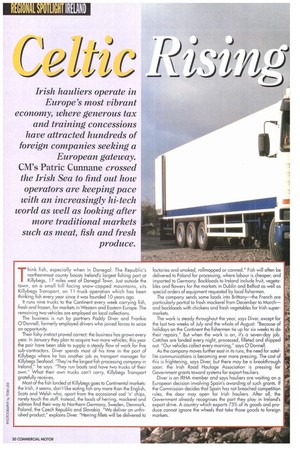T hink fish, especially when in Donegal. The Republic's northernmost county
Page 144

If you've noticed an error in this article please click here to report it so we can fix it.
boasts Ireland's largest fishing port at Killybegs, 17 miles west of Donegal Town. Just outside the town, on a small hill facing snow-capped mountains, sits Killybegs Transport, an 11-truck operation which has been thinking fish every year since it was founded 10 years ago.
It runs nine trucks to the Continent every week carrying fish, fresh and frozen, for markets in Western and Eastern Europe. The remaining two vehicles are employed on local collections. The business is run by partners Paddy Diver and Frankie O'Donnell, formerly employed drivers who joined forces to seize an opportunity. Their fishy instinct proved correct: the business has grown every year. In January they plan to acquire two more vehicles; this year the pair have been able to supply a steady flow of work for five sub-contractors. Diver spends most of his time in the port of Killybegs where he has another job as transport manager for Killybegs Seafood: "They're the largest fish processing company in Ireland," he says. "They run boats and have two trucks of their own." What their own trucks can't carry, Killybegs Transport gratefully receives. Most of the fish landed at Killybegs goes to Continental markets: the Irish, it seems, don't like eating fish any more than the English, Scots and Welsh who, apart from the occasional cod 'n' chips, rarely touch the stuff. Instead, the loads of herring, mackerel and salmon find their way to Northern Germany, Sweden, Denmark, Poland, the Czech Republic and Slovakia. "We deliver an unfinished product," explains Diver. "Herring fillets will be delivered to factories and smoked, rollmopped or canned." Fish will often be delivered to Poland for processing, where labour is cheaper, and imported to Germany. Backloads to Ireland include fruit, vegetables and Flowers For the markets in Dublin and Belfast as well as special orders of equipment requested by local fishermen. The company sends some loads into Brittany—the French are particularly partial to fresh mackerel from December to Marchand backloads with chickens and fresh vegetables for Irish supermarkets.
The work is steady throughout the year, says Diver, except for the last Iwo weeks of July and the whole of August: "Because of holidays on the Continent the fishermen tie up for six weeks to do their repairs." But when the work is on, it's a seven-day job. Catches are landed every night, processed, filleted and shipped out. "Our vehicles collect every morning," says O'Donnell. As the company moves further east in its runs, the need for satellite communications is becoming ever more pressing. The cost of this is frightening, says Diver, but there may be a breakthrough soon: the Irish Road Haulage Association is pressing for Government grants toward systems for export hauliers. Diver is an IRHA member and says hauliers are waiting on a European decision involving Spain's awarding of such grants. If the Commission decides that Spain has not breached competition rules, the door may open for Irish hauliers. After all, the Government already recognises the part they play in Ireland's export drive. A country which exports 75% of its goods and produce cannot ignore the wheels that take those goods to foreign markets.




















































































































































































































